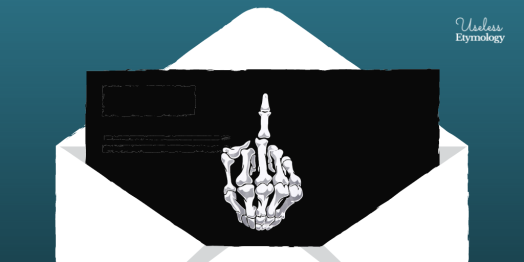
From Michael Waters for Atlas Obscura: “Beginning in the 1920s, nightclub-goers in Berlin who feared face-to-face encounters could communicate with beautiful strangers from across the room. All they needed to do? Turn to the nearest pneumatic tube. Two nightclubs in particular—the Resi and the Femina—pioneered the trend. At the Resi (also called the Residenz-Casino), a large nightclub with a live band and a dance floor that held 1,000 people, an elaborate system of table phones and pneumatic tubes allowed for anonymous, late-night flirtation between complete strangers. Phones were fixed to individual tables, and above many was a lighted number. Singles needed only to look around the room, note the number, and then direct a message to that table.”
Einstein and Oppenheimer’s relationship was complicated

From Hillary Busis for Vanity Fair: “Though Einstein and Oppenheimer both lived and worked at Princeton after the war—specifically at its Institute for Advanced Study, where Oppenheimer served as director from 1947 to 1966—they were not particularly close friends. But they did enjoy each others’ company. In 1948, knowing Einstein’s love of classical music, and knowing that his radio could not receive New York broadcasts of concerts from Carnegie Hall, Oppenheimer arranged to have an antenna installed on the roof of Einstein’s modest home. This was done without Einstein’s knowledge—and then on his birthday, Robert showed up on his doorstep with a new radio and suggested that they listen to a scheduled concert. Einstein was delighted.”
Note: This is a version of my personal newsletter, which I send out via Ghost, the open-source publishing platform. You can see other issues and sign up here.
How a Montreal copywriter swindled victims out of $200 million by pretending to be a psychic
![Best Psychic Reading Services [2022]: Top 10 Online Psychics for Accurate Readings](https://ewscripps.brightspotcdn.com/dims4/default/475eee9/2147483647/strip/true/crop/898x505+0+48/resize/1280x720!/quality/90/?url=http%3A%2F%2Fewscripps-brightspot.s3.amazonaws.com%2F4d%2Fbc%2F5fc44e1741e6954f69c24e4ba070%2Fpsychic-reading.JPG)
From Rachel Browne for The Walrus: “Now fifty-seven, Runner spent most of his life at the helm of several prolific mail-order businesses. Through ads in print media and unsolicited direct mail, he sold self-help guides, weight-loss schemes, and, most infamously, the services of a world-famous psychic named Maria Duval. Under a headshot of Duval, it noted she had “more than 40 years of accurate and verifiable predictions.” The letter promised “sweeping changes and improvements in your life” in “exactly 27 days.” The recipients were urged to reply and enclose a cheque or money order for $50 to receive a “mysterious talisman.” In 2020, after being pursued by law enforcement for years, Runner was arrested in Spain and extradited to the US on eighteen counts, including mail fraud, wire fraud, and conspiracy to commit money laundering, for orchestrating one of the biggest mail-order scams in North American history.”
I worked in a massage parlour for five years, and here’s what I learned

From Lana Hall for Hazlitt: “I was a university dropout in my early twenties when I started that gig, struggling to find my place in Toronto, a city where squalor and decadence collided behind the glass and steel of the downtown skyline. To get by, I took a job at a massage parlour in the northwest corner of the city. My regular shift at the parlour ran from 2 p.m. to 2 a.m., and I worked anywhere between three and six shifts a week. It was a job that was unbearably tangible at times, an onslaught of surgical scars and sun-damaged chests I rubbed oil over, the soft pallor of flesh under my hands that rarely saw the light of day. Yet it was also predicated on a precariously suspended reality, one I had to maintain with absolute precision to do my job well, to pretend that a profound mutual desire could be found for the low, low price of $80 in a strip mall off a freeway.”
Tenzing Norgay: The mountaineer who refused to be categorized

From Imogen Lepere for JSTOR Daily: “It’s May 28, 1953, and two men are standing at the top of the world. One, a farmer from New Zealand called Edmund Hillary, reaches out his hand. The other, known as Tenzing Norgay, a Sherpa with an infectious smile, pulls him in for a hug. They’re the first people ever to stand on this ridge, which soars 29,031 feet above sea level. After the expedition, both men became heroes. Arguably Hillary received more credit, despite the fact that Norgay had attempted to climb Everest on five previous expeditions and his first-hand knowledge was fundamental to their success. Throughout his life, Norgay remained an enigmatic figure, and some details of Norgay’s life remained shrouded in mystery until well after his death. Although he spoke six languages, he was illiterate. And he may not even have been a Sherpa.”
The word “blackmail” has nothing to do with mailing a letter

From Jess Zafarris: “In the 1500s and extending through the mid-1800s, clan chieftains and other officials in Scotland and northern England were known to run protection rackets against farmers. The practice was called blackmail, with the “black” part referring to the evilness of it. As for the mail part, in Middle English male meant “rent” or “tribute.” It is from the Old English mal meaning “agreement,” a term originally adopted from Old Norse. So “blackmail” essentially means “evil rent” or “evil tribute.” This type of “mail” is not at all related to the words “mail” as in letters, “mail” as in armor, or “male” as in gender. (It’s also unrelated to the Latin-derived element mal- “bad.”) The postage type of mail is from the Frankish-derived, Old French male, meaning “wallet, bag or bundle.” “Mail(le)” armor is originally from the Latin macula, meaning “mesh.”
He was chasing chickens, but he discovered a massive underground city
While trying to recapture his runaway chickens in the 1960s, a Turkish homeowner stumbled through the wall, revealing an abandoned underground Turkish city, now known as Derinkuyu (via Historic Vids on Twitter)

